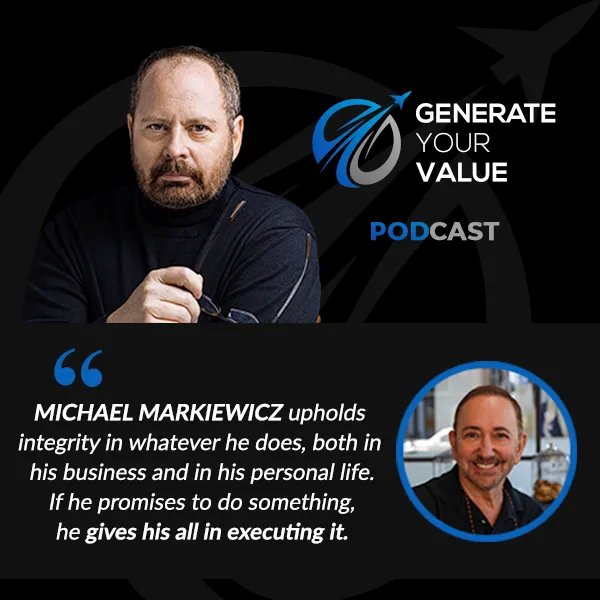Tax planning is a key aspect in keeping your business alive. It affects not only your finances but a lot of other areas of your team as well. Certified Public Accountant Michael Markiewicz joins Andy McDowell and Zach Levy to demystify tax planning and the value of getting an expert to help you through it. He explains why it must never be considered an afterthought as it directly impacts workplace culture and strategic planning. Michael also shares how a CPA like him got involved in the film industry, how media consumption evolves alongside digital channels, and his insights about traveling the world.
LISTEN TO THE PODCAST HERE
Getting Tax Planning Right For Your Business With Michael Markiewicz
TAX PLANNING IS OFTEN OVERLOOKED AS A KEY INGREDIENT TO THE BUSINESS STRATEGY PLANNING PROCESS
Welcome to the show. I’m your co-host, Zach Levy. Joining me as always is Andy McDowell. Andy, It’s great to see you.
It’s great to see you, Zach.
We got a great conversation with us. We had an episode earlier in our season with Mark Smeltzer. He’s on the producing and directing or the mechanics on the movie side. We’re going to bring a different slant for you on the film and entertainment side like the back office kinds of things. I’m looking forward to this conversation.
Zach, you and I got educated by Mark on the inner workings of putting a film together. I know I’m going to get educated on some back-office things with our guest. Our guest is Michael Markiewicz. He’s a CPA in New York City. Let me read his bio and then we’ll bring Michael into the conversation. Michael has got 35 years of experience in providing financial guidance to entertainment professionals, family offices, small businesses, and C-level executives.
He’s based in New York, specializing in CPA services, consulting services, and all-important asset protection. We all need protection from that perspective. He graduated from Tufts University with a BA in Economics and Sociology. He received his MBA in MS in accounting from Northeastern University. The common theme here is he’s from Boston if you haven’t connected those two things.

He has made the trek from Boston, New York. We’ll let him tell us how that journey is. He has a number of certifications. He’s the Financial Director of Marriage Equality USA, and a member of the National Gay & Lesbian Chamber of Commerce. Outside of work, he studies and plays guitar, which I do enjoy singing as well. I do it every Sunday. He’s an artist in oil and other media. He loves movies and the theater, which I also love.
He is a huge animal rights activist. I try to get one of my puppy dogs to come over before we hit the record button to say hi to Michael but they’re very shy. Maybe before we leave, we can make that happen. He serves on the board of the Moving Windmills Project. He acts as a treasurer of a non-profit organization where the mission is rural economic development and education in Malawi, Africa. Michael, welcome to the show. It’s awesome to have you here, and a fellow New York area person. I’m from Jersey growing up. It’s always nice to have North Easterners here. How are you doing?
First of all, good morning to both of you. Thank you for having me on. It’s a pleasure to be here. Everything is great here in New York, working away, working hard, enjoying life, and here we go.
Also, enjoying the travel life, which we’ll get into later on in our conversation. Michael, we’re a big fan of telling the story. For our audience, so they can figure out how they fit within your story and have a connection to you in some way, can you give our audience an idea or a Reader’s Digest version overview of how you got into the CPA business?
As you mentioned, my undergraduate work was at Tufts University. One of my majors was Economics. The other one was Sociology. As I was getting closer to graduation, I was trying to figure out what I’m going to do. Tufts doesn’t have a business program at all. Within the Economics department, they had a basic accounting course. I took that course. It came so easily to me. I could do it with my hands tied behind my back.
I decided that I was going to go on to grad school, and I applied to five different graduate schools. They were mostly all strict MBA programs. I’m not saying this to pat my back, but I got into all of them. I decided to attend Northeastern University in Boston because it had a focus on the accounting CPA side. I felt like it came naturally to me so I decided to go in that direction.
It has served me well. I don’t know how many in the audience know that Northeastern University generally has a co-op program where you go to school, and then they place you somewhere. You work, you earn some money and life experience, and then you go back to school and finish. That’s what happened in the graduate program that I was in. When I was done, I had a job waiting for me at Deloitte in Boston. It’s one of the big four accounting firms. It was the big eight back in my day, but it was the big four now. That got me on the road to becoming a CPA.
My alma mater’s Georgia Tech co-op program was very popular. They placed people in IBM and some of the other big tech companies. It usually took an extra year to get through the degree program and get you a degree, but you walked out with so much more experience than those that didn’t. I said to myself that if I were to do it all over again, I’ll probably do the co-op program.
I found it to be helpful. Working for three months with a firm like Deloitte was an invaluable experience for me.
Michael, you’ve worked with both large and small businesses across industries. From that experience, what would you say are some of the top things that every company struggles with when it comes to achieving success?
In my experience, I would point to the fact that there’s always such an emphasis on both the top and the bottom line. In order to achieve the objectives of the top and the bottom line, you need to hire and develop good people. A lot of executives bring people in and they don’t focus as much on the development process.
It may have changed now, but especially in my day, companies would hire people and put them at a desk and say, “Here, go to work.” With very little training, development, encouragement, and any of that. Companies are made up of people. In order for a company to work efficiently and effectively, not only do you have to have good people and the right people but you have to encourage them, treat them fairly, and train and develop them.
For a company to work efficiently, you need more than the right people. You have to encourage them, treat them fairly, and develop them.
Historically, companies have struggled with that. As a result, there has been a tremendous amount of turnover in many companies in many industries despite them saying it isn’t so. Turnover costs a tremendous amount of money because then you have to replace them. You hire new people. You supposedly and hopefully train and develop them again, so you’re starting from square one. If you want to hire experienced people, you still have to train them in the culture of the organization, and acclimate them to that culture, even if they’re trained in the skills. There’s always a training and learning process. A lot of companies have fallen down on that, at least historically.
You said a word there, culture. Culture eats strategy for breakfast. We talked about this in our first season when we were going back and forth discussing focusing on strategy top and bottom line, and completely missing the most important part.
We also have a theme going between two episodes in a row. We interviewed Lieutenant Colonel Otis McGregor. We asked him a question about what’s the difference between the military side and the corporate business side relative to leadership. His answer was, “In the military, we train people for the position.” Before you even get the position, you’re going to some school somewhere in the military system and getting trained for it, then you get put in that position. Whereas in the corporate world, they don’t do that. That’s straight to your point. People are being placed but not being trained on the ins and outs of the work, and setting themselves up to be successful.
I know Otis. He’s an amazing guy. I have not ever served in the military. I have the utmost respect for those that do. Otis hit on something important, and what I know about it, he’s spot on. Companies and businesses pay lip service to training and education. They don’t do it effectively in my opinion.
What you said, Andy, with respect to training people in the work and the systems is one thing, but Zach, you brought up the word culture. I don’t think companies train people about their culture and help new employees especially fit into the culture. That is so critical in many ways. It’s at least as important as training people on the systems, how to do things, and how this company does things.

Going back to the culture for a moment, it’s an issue that is dear to my heart. I’m self-employed. I’m a partner in a three-partner firm here, but I have been an employee in many different organizations, CPA firms, and the private industry as well. I never got that kind of training and immersion into the culture of an organization. The lip service was, “We’re a great place to work.”
That’s so easy to say, but what does that really mean? When I first started, I didn’t know any different. I thought, “This is great. I’m so happy that this is a great place to work because I’ll be happy here.” A few months down the road, you find that it’s maybe not such a great place to work, but you stick it out and you hang on for a while.
In all of the different positions that I’ve held in other organizations other than my own, when I first started out in that organization, I said, “The grass here is going to be greener than the last place.” Six months in or maybe even less than six months in, I found that the grass is just as brown as anywhere else. I’ve done this twice in my life. I left the corporate world and started my own thing, and became a self-employed entrepreneur.
That’s a very common problem. Let’s move to another subject. It’s one that causes people’s faces to get sour whenever you bring it up, and that’s taxes. We’ve had some CPAs and financial folks on, but we haven’t talked to anybody about taxes. Having spent some time with you in other ways, I know that taxes is a topic you like to talk about.
How important is tax planning to a company? Does it tend to be an afterthought? “We don’t want to talk about it. Let’s sweep it under the rug.” Is it alive in the business world and is an active conversation all the time, and I just haven’t seen it? How do you feel about tax planning in today’s business world?
Tax planning is critical because I don’t believe that it should be the driver of business. It should be integral to the operations of a business. There are two parts to doing tax work. There’s tax compliance, which is completing tax returns, determining what is owed, payments, and all of that. That’s tax compliance.
What’s more important than tax compliance is tax planning. How do you structure a business? How do you structure transactions? How do you structure everything that you do to take advantage of the existing tax laws to the benefit of the business and the industry that you’re in? What are the available deductions and credits that many people and many businesses may not be aware of? Some of them may if they’re well-versed and educated enough. I don’t believe that taxes should be the primary driver, but they certainly should be an integral part of the planning, whether it be the business plan.
Every company that’s starting out should have a good business plan, and taxes should be a part of that. I have seen business plans where I don’t see anything on the business plan about tax planning. You got to have that because it does impact what the bottom line is. It may not impact what the top line is, but it’s definitely going to impact the bottom line.

In many companies, it’s an afterthought. In more companies, certainly with my clients, it isn’t or shouldn’t be because I reach out to my business clients and say, “Let’s talk about what’s going on this year, what you need to do, and how to do that from a tax efficiency perspective.” I still get clients that don’t do it. All of a sudden, tax filing season happens, which is starting now. They’re like, “How come I owe that much money?” I said, “Back in April, May, and June of last year, I started to talk to you about this and you didn’t want to deal with it, so here we are.”
I always ask my business clients, “Keep me informed about what’s going on during the year. How are you doing? What’s going on? Send me a balance sheet and a P&L statement so that I can guide you. In terms of some things that you might be able to take advantage of.” Tax planning is critical. Tax compliance is a necessary evil, but it is a necessary aspect of the whole thing.
The business strategy looks at different areas of the business from the marketplace, what the competitors are doing, where your strengths and weaknesses are, so forth and so on. It seems to me that tax planning ought to be a critical element of the process you go through for strategic planning for the company. It’s a critical element both at the very beginning when you’re building your business plan, before launch, and then when you’re actively engaged in the business and looking at it year over year. As you’re building a strategic plan for the year, tax planning should be part of the conversation.
I concur. Sometimes companies are a little penny-wise and pound-foolish. They don’t want to pay their CPA for the extra time that’s involved in doing the tax planning. They end up in a far worse situation than if they had paid their CPA to work with them to devise a tax strategy.
There’s that saying, “Miss the forest for the trees.” Michael, talk about being in the financial world or the CPA world, how did you get involved in the film industry? What makes a great investment in a film?
About 12 to 13 years ago, I was approached by an attorney I know here in New York who does a lot of work in the entertainment industry. He had a new client. They were a production company out of Spain that set up a company here in New York and filmed a couple of productions here in New York. I’m not sure how many people understand what film production accounting is.
Anyway, the attorney approached me and says, “Do you do film production accounting?” I learned something from Richard Branson. He said that when somebody asked you to do something, even if you don’t know how to do it, say yes. I had never done film production accounting before. I said to this attorney, “Yeah, I could do that.”
I started googling, researching, and figuring it out. I learned a tremendous amount about film production accounting. Film production accounting can be different depending on the geographic location where a film is being shot. Each geographic location and jurisdiction has something called film tax credits that are specific to that jurisdiction.
If they’re filming in New York, New York has. If you’re filming in Louisiana or Georgia, these are some of the states that I’m aware of that have strong tax credits. I can watch a show streaming on TV. In the end, we’ll have this pitch with Georgia on it. We have the same here in New York, but it’s a different thing.
The film production accounting has to be done based on a chart of accounts that’s accepted by that jurisdiction. After the production is completed, they have to go apply for the credit and have to be in the specific set of financials and charts of accounts that they will accept. I learned how to do it, and I did one film with them.
I did a second film with that same production company, and then I started getting other work by word of mouth from other producers, directors, and whatnot. They’ve asked me to be the film production accountant for those. Films that are done by major studios have their own in-house accounting teams. It’s the independent films that don’t and need someone who does that work.
That’s how I initially got into the film industry. Through that, I’ve met people, not only with the productions that I was involved in but with other people as well because now I was in that “world.” I was asked to invest in a project that had some big names associated with it. One of them is Keanu Reeves, and I love Keanu Reeves. I thought, “Keanu Reeves is going to be in it, then that’s going to be a great film.”
That’s not how to evaluate a film for investment. I made an investment in that film. I lost all my money on that one. I hadn’t invested in another film until last year. That film is in development right now. It hasn’t started shooting yet, but the people that are associated with the film are people I know, trust, and love. I felt like this is going to be something that I could get behind.
The film is probably going to start shooting later somewhere in Louisiana. I’ve been told Lake Charles, but I don’t know for sure. I may get a small walk-on role. If I do, I’d go to Lake Charles and be in the film. The other thing I’ve done is not so much in the film industry, but it is still within the entertainment industry. I’ve gotten involved in being an investor in live theater.
As you know here in New York, we have a ton of it. There’s Broadway and off-Broadway. There are also touring companies that travel around the country, and some around the world. I have been and continued to be an investor in a number of different live theater and live performance productions, both here in New York, as well as touring companies and Vegas. I’ve done some internationally as well, but because the pandemic hit, those went by the wayside. It’s unfortunate but it happened. Nobody is to blame. It is what it is.
If somebody were looking to invest in live theater or movie production, would you say it’s like opening the hood on a company or a business? With a public company, you have an opportunity to buy stock and ownership into a company. Generally speaking, you have the ability to open up the hood and look at what the business is doing, what the strategy is behind it, and how I feel about that strategy relative to what’s happening in the marketplace. It’s that type of thought process before you put dollars down the table and buy a stock. With film and life theater, is it the same scenario where you have an opportunity to open up the hood and look at the people that are involved in it, and the actual storyline or script to make that determination on an investment?
There are several factors to be considered. One of which is the people that are involved in it. What is their experience? What have they done that has been successful? What have they done that has been unsuccessful? The ones that are unsuccessful, why was it unsuccessful? When I first got into it, the first Broadway production I invested in closed in three weeks, which meant that whatever money I put into it, I lost my money.
I was a little starry-eyed about the idea of me being an investor in a Broadway show because I love the theater. I’d go to Broadway shows a lot. I was not as familiar with the background, inner workings, and finances of what it takes to put on a show. I became more aware of it through that experience. I wasn’t still fully aware. I had to sit back and analyze that experience and say, “Why did this not do well? Why did it close in three weeks?”
I happened to have loved the show and the production, but Broadway requires significant capitalization. It costs a lot of money to put a show on a Broadway stage. There’s the cost of the theater. There’s the cost of everything involved with it. It’s a huge cost, which is why there isn’t a single show that is produced on Broadway that is done by one producer. It’s a team of producers.
They’re all co-producers. You might have a lead producer, but then you have all these co-producers. All these co-producers have a requirement that they have to raise this amount of money. They go out and find investors. I’ve been one of those investors through a number of different producers that I know here in New York. In my analysis, I learned why that show closed in three weeks.
It was a musical with beautiful music, beautiful production, and all of that. As beautiful of a show as it was, it had a very dark subject matter. In order for a Broadway show to succeed and do well on Broadway, it has to appeal to everybody from middle America to the south, to the west, you name it. People come to New York and one of the things they want to do is go see a show.
They’ll go see a happy show, especially people that are bringing their kids. They’re not going to bring their kids to see a dark show. This was a dark show. I invested in one other Broadway production that didn’t close in 3 weeks, but it closed in 6 or 8 months. Six or eight months does not make a successful show. It has to run for quite a bit of time in order to not only recoup the initial capitalization but to have profit.
I don’t know whether it was the press people behind it that didn’t do a good job. In New York, we have something called the Tony Awards for Broadway. The Tony organization didn’t promote it. Even during the Tony Awards that year, the way they portrayed this show was so awful. I thought, “This show is going to close,” and it did.
I soured on investing in Broadway, but I didn’t sour on investing in live theater and live production. Now, what I do is invest in touring companies for shows that I think are going to do well on tour. I’ve invested in a Vegas show, which is not theater. You’ve probably all heard of Criss Angel. It’s his show in Vegas, which I had the good fortune to see when I was in Vegas in November 2021 and brought a whole group of people to see it. That just keeps running. That was a good investment. I’m making money on that one.
I’ve changed the way I look at investing in theater or live performance. I look for what I believe is going to do well as a touring company, perhaps another something like Criss Angel. I’m not investing in any more Broadway. I know a lot of people in the theater. I know a lot of producers, directors, actors, and so on and so forth.
Unless you hit on a show that has run forever like Phantom of the Opera, Book of Mormon, or any number of these shows that seem to have a life of their own and never end, then you’re going to likely lose money on investing in a theater. Those are 2% of the Broadway project. You don’t know if you’re going to hit on one. You might get your money back, but you might not make anything. That’s a long-winded answer.
It’s a great answer. I learned so much through that part of our dialogue. Where do you feel like the industry is going? With the pandemic, big-screen movies, theaters, and so forth got hit hard because people had to stay at home. That changed their culture of how they get their entertainment. Even if they weren’t big on Netflix, Hulu, and whatnot at the time, they certainly became big with it because the pandemic forced them inside, and didn’t have much of a choice. Is that changing who the big movie houses are? Are we going to see that continue? Is it going to be the Netflixes of the world that are going to be building all the entertainment and the content? Are the big movie houses going to disappear on us?
The short answer is it’s changing and it continues to change. For example, there’s a movie house or a movie theater a block away from where I live, which recently closed. It’s part of a bigger chain, which is out of Mexico, it’s called Cinepolis. They closed that theater. I just read that there’s a Regal Cinema not too far from me that’s closing as well.
Now, we don’t go to the movie theater very often at all. The reason is because of streaming. We can see so much content on all of the various different streaming services. I’d say we have a lot of them. We have a ton of streaming services that we subscribe to. A lot of people have a lot of streaming services. I don’t know whether this is pandemic related or it was just going to happen anyway because of streaming.
There’s so much content now that’s produced by Netflix, Amazon Prime, Hulu, Disney Plus, Paramount Plus, and Peacock. They are all producing so much content. Even though you don’t get the big screen effect maybe of an Avatar, which is great to see on the big screen, people are saying, “So what? I’ll just watch it at home.” People have their 50-inch or 60-inch or maybe bigger flat-screen TVs at home and it’s pretty good. As long as you’ve got good sound and you’ve got a good picture. What do you need to go to the theater for?
Plus the fact that the theaters jacked up their fees or their rates. At least in New York, for two people to go to the movie theater, it’s about $35 for the tickets. It’s like $16 to $17 per person. On top of that, let’s say you go get a drink or popcorn or something to eat. You’re talking $50 or $60 to go see a movie. It’s crazy. It’s nuts.
Whether it was due to the pandemic or not, a lot of people made the determination that it was too expensive. Let’s say a family of 4 or 5 want to go see a film. You’re talking $200. It’s nuts to go see a movie for two hours. That’s a factor. The fact is that because the streaming services have so much great content, theaters are closing, at least in my neighborhood. To point out your question, Andy, the whole nature of the way we get entertainment has changed and continues to change.
Theaters are closing because streaming services have so much great content.
As far as the finances of those that are concerned like Netflix or Hulu or Prime, they got deep pockets. They can afford to fund the creation of content, which in many ways is more efficient than the way the film studios have done it. Netflix was one of the early streaming services. They’re one of the first. In the last Emmy Awards, they had more nominations than any other streaming service. That has been historically the way it has been for the last number of years. It’s definitely changing. In some ways, it’s for the better. There’s something I miss about going to a dark theater with a number of strangers and seeing it on the big screen, but I’m over it.
I got used to the small screen as somebody that was on airplanes traveling to the other side of the world all the time. Most of my movie watching was on the small screen in the seat back in front of me in business class on an airplane. I had enough hours on the flight in one trip to Russia or China and back. I’d be able to get 5 or 6 movies on a round-trip basis.
Watching it on TV at home now is not a big deal to me because my TV is bigger than the small screen in an airplane. The only time I’ve been in the theater in the last years was when I wanted to watch Top Gun Maverick on a big screen. I made the effort to go to a theater. I agree with you, Michael, about the cost of it. It was nice. I finally had a La-Z-Boy chair to sit in and put my feet up. I have a little table for my popcorn, soda, and everything while I was watching. That’s different, but with the exorbitant cost and so forth, I’d rather sit at home and stream it.
It’s interesting you mentioned Top Gun Maverick because I had not seen it until recently. On a flight from Atlanta to New York, I decided I’m going to watch Top Gun: Maverick. Everybody is raving about this movie. I did it and there were some problems with the entertainment service on the flight, so I didn’t get to finish it. When I got home, it was streaming on Prime or wherever it was streaming on. I scrolled through to where I left off and watched the rest of it at home. I did like it. I did enjoy it.
Shifting gears a little bit here, Michael. You’re a musician and an artist as a hobby. For yourself and as well as others, how does that creativity help with your business personally? How can it help others?
You hit on the word creativity. It’s an important word to use in the business world as well. I have found that people who have an element of creativity in their persona and their life oftentimes bring more to the table in the business world than those who don’t have creativity. I have found that a lot of people who are not creative in any way whatsoever are the kind of people that say, “I’m going to do it this way because this is the way it has always been done.”
People who have creativity in their persona often bring more to the business world.
Many of us know people like that. I’m not trying to knock people that don’t have creativity. The fact of the matter is some people have it and some people don’t. In my opinion, the ones that don’t will do it the way it was done before because they can rely on that. They can say, “I’m safe because this is the way it was done, so I’m going to do it this way too.”
There are people who come to a problem or issue in the business world. They look at the way it’s done before and say, “I might have a better way of doing that. If you do it this way, chances are you’re going to get a better result.” People who are creative can oftentimes think of those different ways to do things or a better way to do things than the way it has always been done. As a business owner, the one thing that I vehemently dislike is when somebody comes to me and says, “I did it this way because that’s the way the last person did it.” I hate that. I don’t care about what the last person does. What about you? It rubs me the wrong way when someone says that to me.
If that was what everybody did, nothing would be where it is because creativity leads to innovation, which leads to disruption, which changes the course of things for the better.
I totally agree with that, Zach. To sum that up, creativity is an important element when you’re looking even to hire people and trying to determine, “What are your creative outlets?” I don’t know that you can necessarily ask them that. I am not an HR person. “What do you do for the rest of your life?” You can garner that from a candidate when you’re looking to hire. Figure out, “What are some of your hobbies? Tell me about you as a person. Not just what you’ve done for work, what’s your experience, education levels, and all that. Tell me about you as a person.”
There’s something to be said about a culture of having that safe space for people to be creative and be open, and bring their own to the table.
That’s the culture I try to bring into my business, even with my business clients in particular, but even with individual clients. Let me give you an example, if I may. I have this married couple. They live here in New York, very wealthy people. They’re both originally from the UK. They have and have lived all over the world. They’re currently living in New York. They’re very wealthy, and they earn a tremendous amount of money. That’s as much as I could tell you about them. They came to me as clients a few years ago because the husband used to work for Deutsche Bank.
When he worked for Deutsche Bank, they had an arm that says, “We’ll prepare all the executives’ tax returns at no additional cost to the employees.” That’s what happened, and then he left Deutsche Bank. He had been referred to me. I started working with them a couple of years ago. Historically, they filed a joint tax return. Most people think that because a couple is married, it’s always best to file a joint tax return, but it’s not always.

I ran some scenarios for them. I said, “If you file a joint, this is what your tax bill is going to be. If you file separately, this is what your tax bill is going to be. If you are willing to file separately, it’ll save you $50,000. Do you want to do that?” Of course, they wanted to do that. Last year, I did the same scenario with them. I didn’t save them quite as much, but it was still a significant saving. They said, “Yeah, absolutely.” It’s about thinking out of the box and saying, “Let’s run these scenarios and say, “If you file this way, you’ll pay this. If you file this way, you’ll pay that.”
I would say many people who are CPAs don’t think to run that scenario. They’ll say, “You’re married. File a joint.” That’s it. They’re done. I would say many would not run that scenario. I’m not saying that to pat myself on the back. I’m just saying you got to think outside of the box. You got to think creatively when you’re working with your clients.
Michael, I was fortunate enough, in my twenty years at the Boeing company, to travel around the world and engage with different cultures and different people. I feel like it’s had an influence on me from the perspective of being open, curious, and not being myopic with the US point of view. If somebody doesn’t travel at all outside the country and watches the news channels as they are, they only form their opinion from that perspective on things. The favorite question I always got, usually in taxis as I’m going to and from the airport, the taxi drivers always wanted to talk about the American president. I got some interesting comments and conversations from that.
As somebody like yourself and with your partner that likes to travel around the world quite a bit, how do you see travel playing into a person’s life, or even as a business leader in their business? Do you see it as a good influential thing? Do you encourage people to travel like I encourage people to travel and see what the rest of the world has to offer, and help a little bit to be an influence on how you perceive the world?
The short answer is yes, but let me give you a little background. I’m the first generation in this country. My parents who are no longer with me were Holocaust survivors. They both came from Holland and spent the war years in Siberia under Joseph Stalin. After the war, they ended up in refugee camps in Austria, which is where they met. They fell in love and got married.
My sister was born in Austria. When she was eight months old, they came to this country. I was born in Boston. My first language was not English. My first language was Yiddish because that’s what we’ve spoken at home before my parents learned to speak English. I always had this perspective of the world, the United States, and other parts of the world that may be different than it is for many people in the United States. I’ve always felt comfortable being in the United States.
I’ve always felt comfortable, specifically, being in Europe, even though I’ve traveled outside of Europe and other parts of the world as well. Specifically in Europe, I always felt like I had a foot planted there and I had a foot planted here. For me, travel is a no-brainer. You have to travel. I’m not saying you have to travel, but I have to travel because I feel like there’s so much that we don’t know about the rest of the world and culture. If we don’t travel, we’ll never learn about it.
There are a lot of people in this country that are very US-centric about America. I’m not criticizing them. All I’m saying is that there’s a whole other world out there. There are many different worlds out there. I’ve traveled throughout many different countries in Europe. I’ve traveled in South America, Australia, and New Zealand. I have not traveled that much in Asia. I’ve traveled in the Middle East. Sadly for me, but that will be fixed, not yet much in Africa.
Everywhere that I have traveled when I encounter people in their local country and their local environment, I love to engage with people even if I don’t speak the language well. learn about them and hear about them. As proud as many people in the United States of America are, many people in those other countries are proud of their country just the same. That’s great. There’s so much wealth and richness in the different cultures that I have experienced.
I can only speak for myself when I say it has enriched me to be able to have those experiences of speaking with people in other cultures and in other countries, wherever it may be in the world. I learn about them, eat their food, and learn a little bit about their language, their customs, their culture, all of it. I’m like, “This is amazing.” Andy, I don’t know if you are aware of this but I think you may be. My husband and I recently purchased an apartment in Madrid in Spain. We’re on the verge of buying a second place on the Costa del Sol in the south. Our plan in the not-too-distant future is to move to Spain.
I knew you had plans to move to Spain and you had a place in Madrid, but I didn’t know about the second one.
We were there over the holidays this past season. We went south to the Costa del Sol. We are in contract. We are supposed to close on Thursday, barring any unforeseen circumstances. You know how that works. The whole idea is we’re looking to get what they call the golden visa, which requires you to spend a certain amount of money in order to apply for it.
With the place we bought in Madrid, we weren’t quite there. This is over the threshold. It’s going to be mostly a vacation rental property, so it’s rented out most of the time. That’s personal but I find that we want to live in Spain. I’ve never lived in another country. I want to live in another country. That doesn’t mean I’m severing my ties with the United States.
I’m still going to be a citizen of the United States because I won’t be a citizen of Spain. Even with the golden visa, it doesn’t make me a citizen, so I’m still a citizen here. To me, traveling around the world is one of the most important things that I have done in my life to enrich my life. I highly encourage it for everyone and anyone that has the means to be able to do so. Obviously, there are a lot of people that don’t but I am fortunate.

Michael, as a member of the LGBTQ Community, what challenges would you say that members of that community face when it comes to starting and running a business in today’s world?
That depends on your jurisdiction and geography. It does vary significantly, and the challenges vary. It doesn’t mean that there aren’t challenges in any way, but the challenge is acceptance. I don’t like to use the word tolerance because tolerance is like, “I’ll tolerate it even if I don’t like it,” as opposed to fully embracing and accepting people who are members of the LGBTQ community.
I have had some struggles in my life as a result of that, but I’ve had fewer than others, maybe more than some others. That’s changing though with the younger generations. People are coming out at a much earlier age than I did, for example. It’s easier for them to come out because there is more acceptance certainly than there used to be when I was growing up and I was becoming of age. I see young people in their teens and early twenties fully embracing and accepting who they are as LGBTQ people and going through the process.
In the business world, it’s a little bit different because generally, the business world is a little bit more conservative. However, there are organizations that have come up and sprung up that assist members of the LGBTQ community to be successful in whatever businesses they decide to do. One of the most important things for members of the LGBTQ community to do is to be fully out as to who they are and appeal not just to customers and clients in the LGBTQ community, but to everybody.
As we advance in our society, more people are more accepting of this whole concept of diversity, equity, and inclusion. Diversity, equity, and inclusion apply to LGBTQ people, Black people, Hispanic people, women, foreigners, and everybody else. Certainly, LGBTQ people are a big part of that as well. There are larger and major organizations like public companies that hire people as their DEI officers to promote diversity, equity, and inclusion in their organizations.
It has changed and has gotten a lot better than it used to be. We have ways to go and there are still some challenges, but they’re far fewer than there used to be. I go back to what I said right at the beginning about jurisdiction and geography. There are parts of this country that are not yet maybe ever accepting of people in the community. I’m always hopeful that things are going to change everywhere.
Michael, our time is coming to a close. We can’t thank you enough for coming to the show, spending some time with us, and sharing your wisdom in your area. If somebody wanted to reach out and connect with you on the film industry, being a CPA, or anything that you are working on, what’s the best way somebody could reach out?
There are two ways. One is by email. I’ll put my email in the chat. I’m also going to give you a link to my media kit. Let me bring it up to make sure. That has some information about films and other projects that I’m involved in. That is www.MichaelMarkiewiczMedia.com. I prefer no phone calls, however, if someone wants to text me, I can give you my cell phone number. I don’t answer phone calls from people that I don’t know. I let it go.
I know what that’s all about.
If they want to text me and say, “I heard you on this show. I’d love to chat. Here’s who I am.” They can introduce themselves that way. I will get back to people. The media kit is where you can get ahold of me. There’s my email and my cell phone number. Those are the best ways to do so.
We’ll make sure it gets out there so people can reach out to you. Zach, do you want to do the honors?
Of course. Michael, we did brief you on this. I hope you didn’t think enough. No pressure. We end every episode by asking our guests the same question. I don’t think we’ve gotten the same answer yet. There might be some overlapping themes, but everybody’s answer is their own. There’s no right or wrong answer. It’s what’s in your heart and truly what this is to you. Mike, when you hear the words generate your value, what does that mean to you and your world?
When we initially spoke about this, I said, “What does that mean?” I’ve had a little bit of time to think about that. This dialogue that I’ve had with both of you helped me to gel a few thoughts related to that. There are several different things I would say. One of which is knowing what your own values are.
One of the key ones for me is integrity. Whatever it is you do, whether it’s in your business life or your personal life, do it with integrity. If you say you’re going to do something, do it. If you can’t do it, explain why you can’t do it and follow up with an alternative. Integrity is so important to me. It’s probably one of the key values that I have.
If you say you’re going to do something, do it. If you can’t, explain why and always follow up with an alternative.
The other thing I thought about is being on this show, being on other podcasts, putting yourself out into the world, doing things, and getting involved in things that have a positive impact on other people, whether they’d be your clients, customers, or people that you know and love, or a not-for-profit organization that you care about.
Get involved. Lend your expertise, your knowledge, and yourself. Immerse yourself into all of these things fully and wholeheartedly. The value is going to come back a thousand fold, but it’s also going to create value for all of those people that you’re impacting. I’m very proud to say that in my CPA practice, for example, I have very little turnover and a lot of new clients each year. Once in a while, I lose a client. That’s just part of the process. It happens. Every year, I lose at least one, maybe two, or maybe a few more.
I generate more than I lose because of the way I approach my business and my clients through a level of care and integrity. That is the only way that I can work. It’s about owning who I am and what I do and how I do it, and doing the best I can possibly do for them. That’s true in my business. It’s true for not-for-profits. It’s true for anything I do with my family or my dogs, you name it. I do the best that I know how to do, and I do it all with integrity. That is how I generate my value.
We greatly appreciate your answer. We certainly appreciate your time. We know it’s valuable. We value it. We’re grateful for you coming on this episode of the Generate Your Value show, Michael.
It has been my distinct honor, and I appreciate you having me on. It has been my pleasure. I have enjoyed this immensely. I look forward to continuing the dialogue, whether it’s on a podcast or in some other way, Andy.
I’ve been on over 50 podcasts being interviewed, as well as doing this work on this show. I always enjoy the green room time before and after because that’s where a lot of connection happens with people, and relationships are created that still remain today. If you’re thinking about starting a podcast, I highly encourage you because you’ll meet some great people and create some great relationships for yourself, which then enables you to generate value in their lives.
My plate is full at the moment, and certainly during tax season. Thank you for that suggestion though, Andy. It’s certainly something to consider for the future. Maybe I’ll do it once I’m in Spain.
There you go. Do it from the beach.
Do it from the beach or from beautiful Madrid, which is gorgeous.
It’s gorgeous. I love the city. I used to have to go there every year when I was with Boeing. Our biggest trade show was in Madrid every year. For the audience, I hope you got some golden nuggets and some pieces of this conversation that you can use in your own, whether it be in your life, leadership in your business, or the business itself. I do want to put out thanks to the audience because I’m happy to announce that this show is now in the top 10% in terms of listenership in the world.
It is a goal that Zach and I have been working on to keep generating more value in the world. The way we can do it is by having more audience. First of all, I appreciate your listening because it has enabled us to reach that goal. Secondly, keep sharing it. The value doesn’t get delivered from our conversations with great people like Michael unless you share it and spread it around the world so that value can get delivered through this show.
We can’t thank you enough for helping us achieve that goal. We’re going to keep working at it. Ten percent is not good enough for us. We’re now shooting for 5%. We’re going to keep going in the hopes of delivering more value. Once again, we’re very grateful that you’re here tuning in to us. Spread the word. Hit that subscribe button. Zach and I call it the follow button because we want people to follow our journey on this show as try to deliver more value to the world.
Have a great week. Have a great day. Keep generating your value in the world. We’re here to inspire you to wake up every morning, put your feet on the floor, and have that be one of your first thoughts of the day, “How am I going to generate value in the lives of people I encounter?” We’re here to encourage you to do that. With that being said, take care.
—
IMPORTANT LINKS
- Mark Smeltzer – previous episode
- Marriage Equality USA
- National Gay & Lesbian Chamber of Commerce
- www.MichaelMarkiewiczMedia.com
- https://www.MichaelMarkiewicz.net/
- LinkedIn – Zach Levy
- LinkedIn – Generate Your Value LLC
- Facebook – Generate Your Value LLC
- Twitter – Generate Your Value LLC
- Instagram – Generate Your Value LLC
ABOUT MICHAEL MARKIEWICZ

As a CPA and certified financial planner, Michael provides premium services, with particular expertise in providing production accounting services for films in all stages of development from pre-production through post-production. Included in those services is the application for pre-certification of film tax credits and the final application for credit funds to be received. Other focuses of his practice are outsourced family office administrative services and business management for sports and entertainment figures. Outside of his practice, Michael is a successful investor, speaker, and is very involved with many philanthropic endeavors.
Michael graduated from Tufts University with BA in Economics and Sociology. He received his MBA and MS in Accounting from Northeastern University. As a CPA, PFS (Personal Financial Specialist), and CFP, he is a member of the New York State Society of Certified Public Accountants, the American Institute of Certified Public Accountants, and the Estate Planning Council of New York City where he recently served as a Board Member. He is also the Finance Director of Marriage Equality USA and a member of the National Gay & Lesbian Chamber of Commerce.
Outside of his professional life, Michael studies and plays guitar, enjoys singing, artist in oil and other media, loves movies and the theatre (where he is also an occasional investor), and is a huge animal rights activist. Michael also serves on the board of Moving Windmills Project, Inc, and acts as treasurer, a non-profit organization where the mission is rural economic development and education in Malawi, Africa.
Michael lives in Chelsea (Manhattan) with his husband Mark and their beloved wire haireddachshunds, Maggie and Lily.







